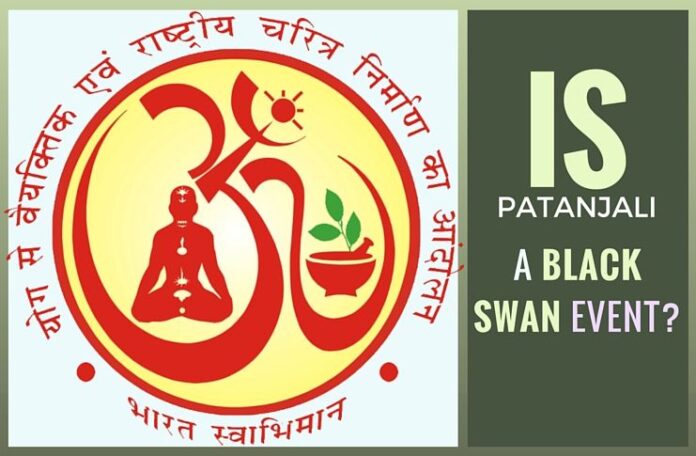
[dropcap color=”#008040″ boxed=”yes” boxed_radius=”8px” class=”” id=””]N[/dropcap]assim Nicholas Taleb in his masterpiece and bestseller “The Black Swan – The impact of the highly improbable” defines a Black Swan event as follows: “First, it is an outlier, as it lies outside the realm of regular expectations, because nothing in the past can convincingly point to its possibility. Secondly, it carries an extreme impact. Third, in spite of its outlier status, human nature makes us concoct explanations for its occurrence after the fact, making it explainable and predictable”. He summarizes it “as the triplet : rarity, extreme impact, and retrospective (though not prospective) predictability”.
Now let us consider whether, Baba Ramdev’s Patanjali fits the bill of a Black Swan Event.
First, the outlier. How many of us had really expected, say in 2005, that a home grown brand celebrity endorsed by a Hindu saint whose business till yesterday was advertising yoga and pranayama on television will sweep the cash registers of modern retail stores selling a myriad of Image result for meaning of fmcg products Fast-moving Consumer Goods (FMCG) products.
Second, the impact. This one is rather obvious with fund houses and brokerages advising exercise of caution to downgrading established FMCG MNC’s and large domestic players’ stock prices on account of differentiated impact on their sales and profitability by the sudden spurt of competition from Patanjali.
Third, retrospective predictability. Come 2015, and Patanjali making it to the shelves of large and small retailers and front-pages and editorials of mainstream economic / financial newspapers. How many of us now think that it was all along possible or that these were Baba Ramdev’s business intentions all through.
The country has seen many Hindu saints – babas and their business(es), but none of the size, scale and organization like that of Patanjali.
“Swadeshi” differentiated
Hitherto, all Swadeshi movements focused on boycott of foreign products and suggested abstinence from certain products for which no local alternatives were available. Baba Ramdev brand of Swadeshi is different, in so far, it has provided local, possibly cheaper, perceived better quality and branded alternatives to products from its competitors in addition to the moral value of “Be Indian, Buy Indian”.
Yadavsthali
Buoyed by the success of Patanjali, Sri Sri Ravi Shankar has also entered the fray of Ayurvedic Medicines and Herbal Cosmetics. So will many others, all keen to grab a pie of what their followers consume. With the first mover advantage with Patanjali, it will remain to be seen whether they receive any traction at all beyond the obvious lot of their limited following.
Conclusion
Baba Ramdev’s Patanjali has emerged as a Black Swan in the Indian FMCG sector giving nightmares to established foreign and domestic players alike. He now faces a backlash from his brethren, all vying to grab a pie of what he may have been led to believe was his sole turf.
Notes
-
Swadesh is a conjunction of two Sanskrit words, Swa means “self” or “own” and desh means country and Swadeshi, the adjectival form, would mean “of one’s own country”.
-
Yadavsthali according to Hindu mythology was the site where the Yadav’s, the descendants of Lord Krishna, decimated their own after fierce infighting.
-
Ayurveda is the traditional Indian Medical system.
- Social Security Payments : Tax or Savings - September 28, 2017
- India Uninc set for a giant leap post Demonetization & GST : A Contrarian opinion - September 3, 2017
- India Myanmar Strategic Economic Cooperation - September 1, 2017








Early in this century I was involved with Swadeshi Jagran Manch in a small way . Our activities then consisted of opposing /discouraging consumer items of foreign origin/Indian products of foreign owners ,pick up equivalent Indian products for promotion/sale at least among our supporters .I cannot vouch for others but I was not at all satisfied of the quality or prices of those so called Videshi products.
In 2006 as I was participating in a programme of the Manch and another of the R S S, I voiced the idea of Indian Multinational( meaning production of goods in India For export and Indians to produce goods abroad and sell in India) as an alternate to our blind opposition to Videshi products .It was but natural that such suggestions coming from an insignificant was ignored with the spite it deserves.
Later on the Swadeshi fora lost lot of steam although the idea persists.
I felt personally very happy when an England concern was purchased by Tatas and on export of Indian quality products were exported to foreign lands.
Baba Ramdev seems to have latched on to such a possibility and with his wide following as his captive consumers and promoters went to cash on his product ‘yogosmetics’.
Black swan or not his is a story of doing the right thing at the right time.
Good points.
We need most of the production and consumption in the radius of few 100 KMs to minimise transportation cost and increase employment.